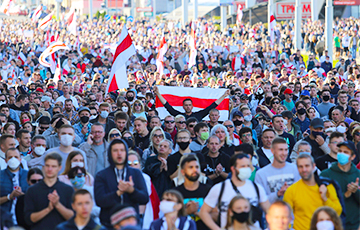Foreign Policy: Protests In Belarus Reached Stage When Lukashenka Could Be Overthrown
24- 16.10.2020, 14:15
- 102,062

The dictator “blinked” first.
In the two months since rigged presidential elections jolted Belarus out of a deep political slumber after a quarter-century of authoritarian rule, a stalemate appeared to be setting in. Demonstrators continued to fill the streets in numbers that until recently would have been unthinkable, while President Aleksandr Lukashenko showed no sign of stepping down.
But then Lukashenko blinked—setting off a chain of events that could cause the situation to escalate in the weeks to come, - writes Foreign Policy (translated by unian.net).
On Saturday, he made an unexpected visit to a KGB-run prison for a four-and-a-half-hour meeting with jailed members of the political opposition, including the former banker Viktor Babariko, Lukashenko’s most formidable rival until he was arrested in June. The president’s press office said that details of the roundtable were to remain secret, but that the goal was to “hear everyone’s opinion.”
The meeting was a dramatic about-face from a president who previously accused the opposition of trying to mount a coup against him, and it was a tacit acknowledgement of the political nature of their detention. Belarus has no shortage of political prisoners, but none has ever been granted an audience with the president.
“This is unprecedented for him to do anything like this,” said Nigel Gould-Davies, a former British ambassador to Belarus. It “suggests a lack of confidence on his part.”
The meeting, which the opposition saw as a sign of weakness, could rattle the country’s elite, who have remained largely loyal to Lukashenko.
“It will puzzle and sow confusion in parts of the elite who until now have been persuaded and rallied round his view on the nature of the opposition and the causes of it, that it’s something illegitimate being sown from the West,” said Gould-Davies, now a senior fellow at the International Institute for Strategic Studies.
What the meeting was not, observers say, was a genuine attempt at dialogue.
“It is disturbing that it was perceived in the western media as Lukashenko signaling that he was ready for a dialogue,” said Katsiaryna Shmatsina, a political analyst with the Belarusian Institute for Strategic Studies. “What kind of dialogue can it be? These people are facing criminal charges,” she said.
Rather, the meeting was widely seen as a way to split the opposition and create a puppet opposition for negotiations. Two prisoners — Yury Vaskrasenski, a member of Babariko’s election campaign team, and Dzmitry Rabtsevich, the director of the Belarus office of the IT company PandaDoc—were released on house arrest shortly after the meeting. In an interview with state media, Vaskrasenski said he had been asked to make suggestions for constitutional changes, though some suspected he was reading from a prepared statement.
The very next day, Lukashenko shattered any pretense he was extending an olive branch when police arrested over 700 people during protests on Sunday, cracking down with a degree of violence not seen since the immediate aftermath of the disputed election in August. On Monday, the deputy minister of internal affairs warned that police were prepared to use lethal weapons against protestors.
“I think these are two logical and connected steps on behalf of Lukashenko. He wants to create a puppet opposition for a dialogue on the one hand, and to end the protests on the other,” said Shmatsina, the Belarusian political analyst.
But this past weekend could prove a turning point in the two-month standoff between the president and protesters. It prompted exiled opposition leader Svetlana Tikhanovskaya to demand that Lukashenko resign by Oct. 25, or face a paralyzing general strike, setting the stage for a dramatic escalation in the weeks to come.
The massive protests—including 100,000 this weekend in Minsk—despite the lack of organized leadership show how widespread the discontent is with Lukashenko’s rule.
“They want their dignity to be respected. That’s more than just a political demand or an economic demand. This is about human rights,” said Hanna Liubakova, a journalist from Minsk and nonresident senior fellow with the Atlantic Council.









